Ecommerce and SaaS businesses grow fast and with every new platform, payout, and subscription model, bookkeeping gets more complex. What once worked with a few manual imports or connectors can quickly turn into hours of reconciliation and spreadsheet cleanups.
Webgility connects a wide range of ecommerce platforms and payment gateways with QuickBooks and Xero, automating transactions and reconciliation. But as operations become more complex, setup and maintenance often demand more manual work, pushing many businesses to seek more flexible, automated solutions.
Why businesses look for a Webgility alternative
Before exploring the list, let’s address the common reasons companies start searching for alternatives:
- Complex setup: Mapping accounts, fees, and tax rules can be tedious.
- Scaling costs: Adding new platforms or transaction volume can push Webgility into higher pricing tiers.
- Limited flexibility: Workflows can feel rigid for multi-entity or international businesses.
- Performance and accuracy: Some users report occasional sync delays or data mismatches when handling very large transaction volumes or complex multi-channel setups, often due to configuration challenges.
If you’ve experienced any of these challenges, the tools below can automate your accounting processes, delivering cleaner data and far less manual effort. These are six of the best Webgility alternatives in 2026, ranked by ease of setup, accounting depth, and scalability.
1. Synder – best overall alternative for automated multi-channel accounting
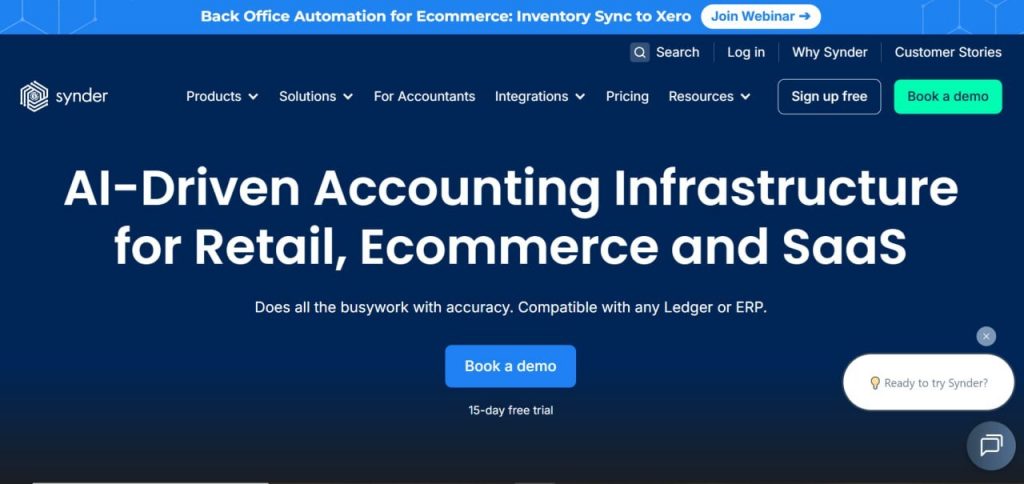
Synder brings clarity and control to modern ecommerce and SaaS accounting by consolidating all your financial data, like sales, fees, taxes, and payouts, into one streamlined workflow. Instead of juggling separate systems for each platform, Synder automatically syncs, categorizes, and reconciles every transaction in your accounting system, giving you real-time, reliable financials with no manual cleanup.
Setup is quick and intuitive. A guided onboarding process walks you through each step, and a responsive support team helps tailor everything to your business needs. Synder keeps every sale, payment, and refund from platforms like Shopify, Amazon, Stripe, and PayPal flowing smoothly into your books, ensuring accuracy and audit-ready records across all channels and currencies.
Key features
- Integrates with 30+ platforms, including Shopify, Amazon, eBay, Etsy, Walmart, Stripe, PayPal, Square, Clover, WooCommerce, BigCommerce, and TikTok Shop, as well as leading accounting and ERP systems like QuickBooks, Xero, Sage Intacct, and Oracle NetSuite, connecting every part of your business in one unified flow.
- Automates transaction transfer from multiple sales platforms to your accounting system, ensuring every sale, fee, tax, and payout is accurately recorded in your books.
- Applies Smart Rules to customize how transactions are categorized, named, and taxed, reducing manual work and maintaining consistency across accounts.
- Supports multi-entity accounting, keeping books for multiple companies or subsidiaries organized while maintaining separate records, reports, and consolidated financial visibility.
- Delivers GAAP-compliant revenue recognition for subscription and deferred income models, ensuring transparency and compliance for SaaS and service-based businesses.
- Protects financial data with enterprise-grade security and full SOC 2 Type II compliance, ensuring safe data handling and continuous protection of sensitive information.
Synder pricing (annual billing)
| Plan | Price & details |
| Basic | $52/month – up to 500 transactions per month, 2 integrations, daily sync, smart reconciliation, basic inventory tracking, multi-currency support. |
| Essential | from $92/month – 500 to 3,000 transactions per month, unlimited integrations, hourly sync, extended inventory tracking. |
| Pro | from $220/month – 3,000 to 50,000 transactions per month, unlimited integrations, product mapping, bundle and assemblies sync, white-glove onboarding. |
| Premium | Custom pricing – built for high-volume or complex multi-entity setups with dedicated onboarding and priority support. |
Why Synder is the best option
When manual work and limited tools start slowing you down, Synder takes your accounting to the next level. Unlike alternatives that cover only one platform or basic data sync, Synder creates a unified financial ecosystem that scales effortlessly with your business.
You can choose between detailed transaction-level syncs for precision or summary entries to keep your books clean and organized when dealing with high transaction volumes. Its automation adapts to your workflow, ensuring accuracy at scale and saving hours of manual bookkeeping every month.
For accounting teams, Synder removes repetitive data tasks; for business owners, it delivers real-time visibility and confidence in every decision. From managing multiple entities to consolidating data across channels, Synder keeps everything consistent and audit-ready, giving you one clear view of your business performance without extra effort.
Ready to see Synder in action? Create a free account or book a 1:1 demo and discover how automation can eliminate manual data entry, simplify reconciliation, and keep your books accurate across every sales channel.
2. MyWorks
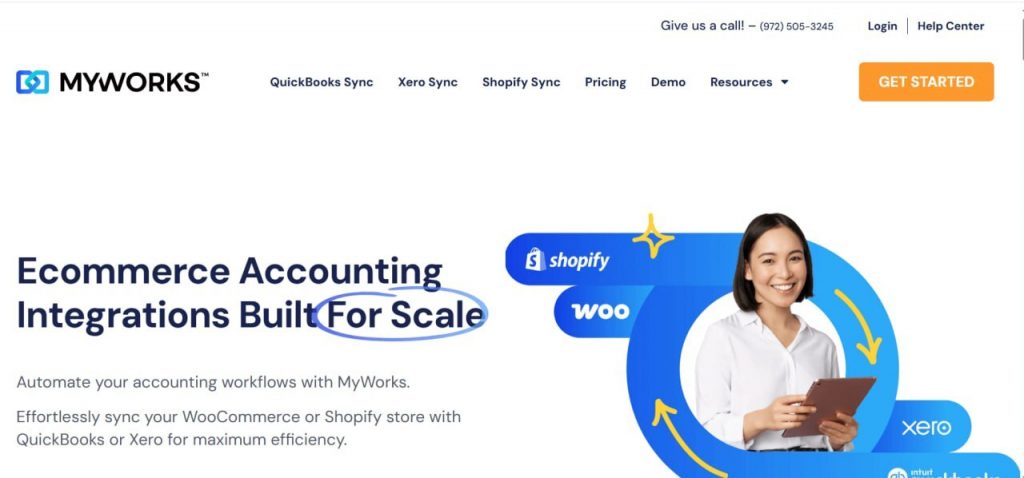
MyWorks is designed for businesses using QuickBooks or Xero alongside ecommerce platforms. It provides synchronization between your store and accounting system, keeping financial and operational data aligned automatically. Changes like new orders, stock updates, or pricing adjustments flow seamlessly between systems, eliminating manual entry and ensuring your books always reflect what’s happening in your store.
Key features
- Native Shopify and WooCommerce integration with accounting
- Two-way synchronization of orders, inventory, customers, refunds, and product updates
- Compatibility with QuickBooks Online, QuickBooks Desktop, and Xero
MyWorks pricing
| Plan | Price & details |
| Launch | $0/month (free forever) – Up to 20 orders, syncs every 1 hour, includes email support. |
| Rise | $19/month – Up to 60 orders, syncs every 30 minutes, includes email support. |
| Grow | $39/month – Up to 300 orders, syncs every 5 minutes, includes email support. |
| Scale | $79/month – Up to 1,000 orders, syncs every 5 minutes, includes priority email support. |
| Soar | $99/month – Unlimited orders, syncs every 5 minutes, includes priority email and 1:1 setup call. |
3. Taxomate
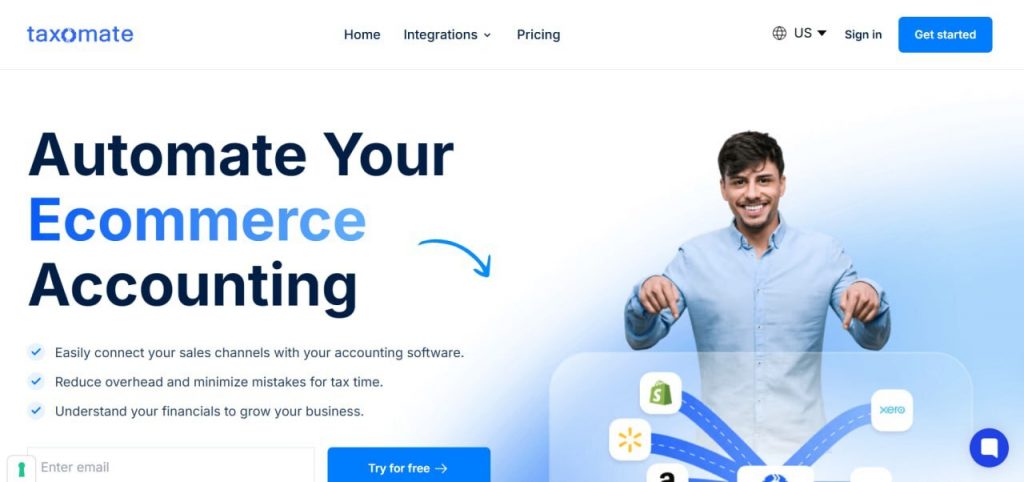
Built for small to medium ecommerce sellers, Taxomate supports integrations with QuickBooks Online, Xero, and Wave while connecting to Amazon and other marketplaces, offering a streamlined way to import and summarize settlement data into your accounting system and auto-post journal entries for efficient reconciliation.
Key features
- Multi-channel integration: Amazon + Shopify + eBay + Walmart + Etsy, syncing data into books
- Inventory & COGS sync (for supported accounting platforms) to keep stock and cost-of-goods balanced
- Built-in analytics & dashboards to view sales, fees, refund trends, and profitability over time
Taxomate pricing (annual billing)
| Plan | Price & details |
| Starter | $12/month (billed annually) – import up to 500 orders per month. |
| 1K Plan | $20/month (billed annually) – import up to 1,000 orders per month. |
| 5K Plan | $37/month (billed annually) – import up to 5,000 orders per month. |
| 10K Plan | $66/month (billed annually) – import up to 10,000 orders per month. |
4. QuickBooks Connector (OneSaas)
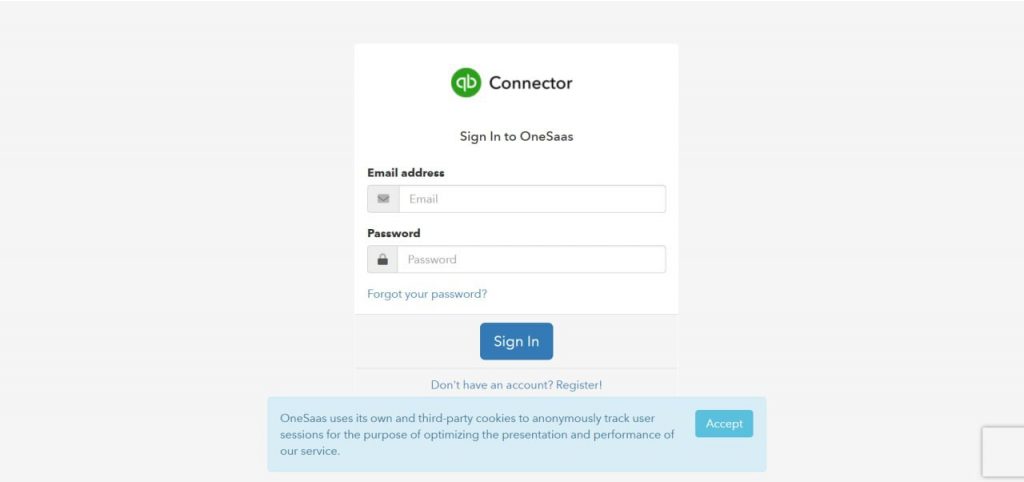
QuickBooks Connector (formerly OneSaas) is designed for businesses using QuickBooks that need basic automation between sales channels and accounting. It integrates directly with QuickBooks Online and connects to Shopify, WooCommerce, BigCommerce, eBay, and Squarespace. The tool automates key workflows like invoice creation, product updates, and customer data sync, providing a simple, built-in solution for QuickBooks users who want to streamline routine accounting tasks without third-party software.
Key features
- Free access for QuickBooks Online subscribers
- Automated order, invoice, and inventory management
- Built-in setup within QuickBooks
QuickBooks Connector pricing
QuickBooks Connector is included at no additional cost with all QuickBooks Online plans, providing built-in automation without extra subscription fees.
5. Zoho Books
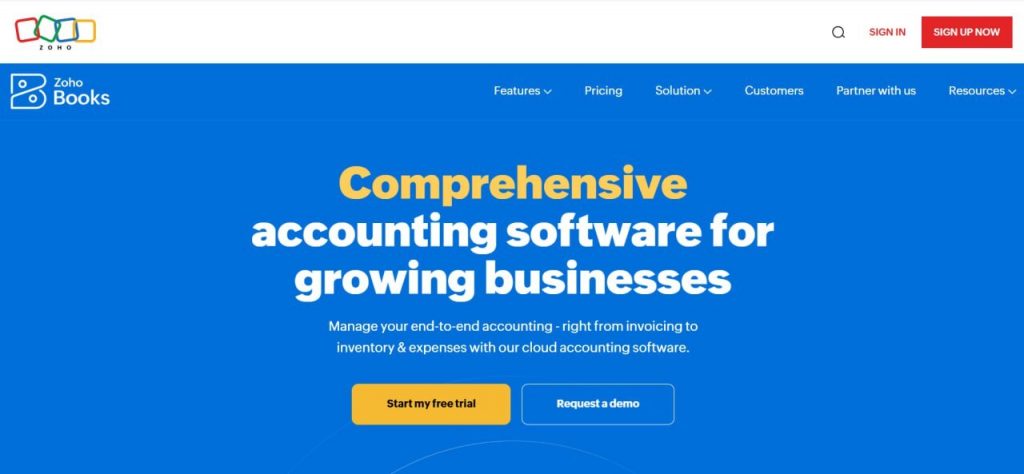
Ideal for small and growing businesses within the Zoho ecosystem, Zoho Books and Zoho Inventory integrate with Zoho CRM, Zoho Analytics, and other Zoho apps, while connecting to Shopify, WooCommerce, Amazon, and Etsy through native or third-party integrations. Together, they provide a unified platform for managing accounting, inventory, and customer data, which is a practical choice for startups and small businesses seeking an all-in-one solution over multiple disconnected tools.
Key features
- Seamless integration across Zoho applications
- Built-in modules for accounting, CRM, and inventory
- Cost-effective solution for centralized business management
Zoho pricing (annual billing)
| Plan | Price & details |
| Free | $0/month – For solopreneurs or very small businesses; includes 1 user + 1 accountant, up to ~1,000 invoices/year, basic accounting and expense tracking. |
| Standard | $15/month – Up to 5,000 invoices, supports multi-currency, recurring transactions, and integrations with other Zoho apps. |
| Professional | $40/month – Adds purchase and sales orders, project and expense tracking, and custom user roles. |
| Premium | $60/month – More users, vendor portal, advanced customization, and automation options. |
| Elite | $120/month – Includes advanced inventory and warehouse management across multiple locations. |
| Ultimate | $240/month – Enterprise-grade features with advanced analytics, unlimited invoices, and priority support. |
6. Sellercloud
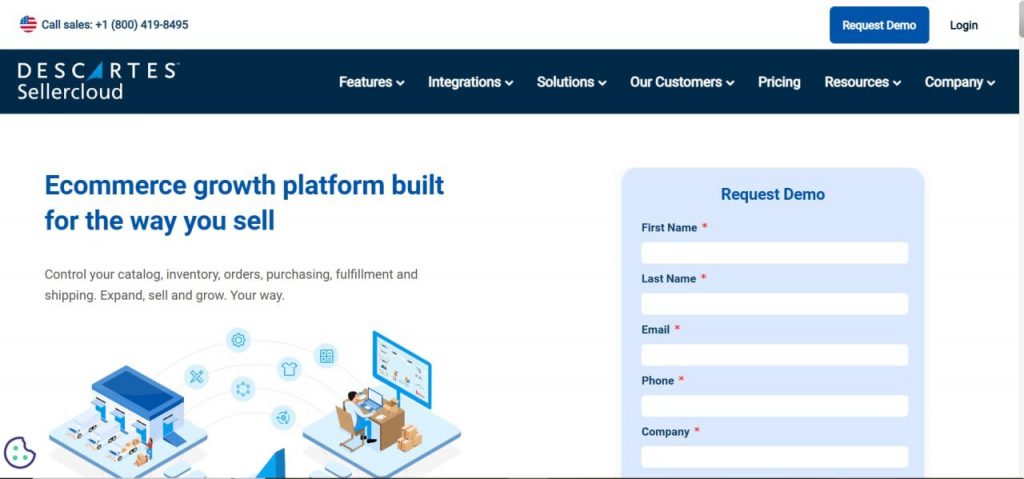
Sellercloud is a comprehensive platform for enterprise retailers managing large-scale, multi-channel operations. It integrates with QuickBooks, NetSuite, and other ERPs, and connects to Amazon, Walmart, Shopify, eBay, BigCommerce, and more. Designed to centralize listings, inventory, orders, and accounting, Sellercloud delivers deep multi-channel integration and scalability for businesses handling high transaction volumes across multiple marketplaces.
Key features
- Centralized management of orders, listings, and inventory
- Advanced integrations with leading marketplaces and ERPs
- Scalable infrastructure for large catalogs and complex operations
Sellercloud pricing
Webgility alternatives: Pros and cons comparison
| Tool | Pros | Cons |
| Synder | ✔ Handles multiple platforms and currencies with precision✔ Highly customizable workflows with Smart Rules✔ Excellent customer support and onboarding experience | ✘ Advanced ERP integrations (Sage Intacct, NetSuite) are available only on higher plans |
| MyWorks | ✔ True two-way data synchronization✔ Real-time inventory and order updates✔ Ideal for QuickBooks- and Xero-centered workflows | ✘ Narrower integration list✘ Requires more accounting setup knowledge |
| Taxomate | ✔ Simple, affordable, and effective solution for ecommerce sellers✔ Multi-channel support (Amazon, Shopify, eBay, Walmart, Etsy) with QuickBooks, Xero, and Wave integrations✔ Built-in analytics for tracking sales, fees, refunds, and profitability | ✘ Limited customization and advanced configuration options✘ Inventory and COGS sync available only for supported accounting platforms |
| QuickBooks Connector (OneSaas) | ✔ Free for QuickBooks Online users✔ Easy activation within QuickBooks✔ Simple automation for core accounting tasks | ✘ Limited control and customization✘ Not suited for complex multi-channel setups |
| Zoho Books + Zoho Inventory | ✔ Affordable all-in-one business suite✔ Strong integration with Zoho ecosystem✔ Includes CRM and inventory modules | ✘ Limited marketplace and payment gateway support✘ Fewer automation options |
| Sellercloud | ✔ Deep multi-channel management capabilities✔ Highly scalable infrastructure for enterprise use✔ Centralized control over inventory, orders, and accounting | ✘ Long onboarding process✘ Expensive for smaller businesses |
Migration tips: From Webgility to a new platform
Switching accounting tools is nontrivial, but here are some best practices:
- Backup Webgility data – export your mappings, historical sync logs, transaction data.
- Run in parallel for a trial period – let both systems run side by side, reconcile, detect mismatches.
- Map all key fields one by one (SKUs, product IDs, tax codes, discounts, fees, refunds).
- Prepare for clean-up – you may need to close or adjust mismatched entries.
- Engage support early – involve both the old and new vendor in the transition.
- Document your workflow changes – the way you handled exceptions in Webgility may differ.
Conclusion
Automating accounting helps businesses move beyond manual work, ensuring their books stay accurate, compliant, and ready to support growth. While there are several tools that can handle parts of the process, Synder stands out as the most complete Webgility alternative for modern businesses.
Synder unifies sales across multiple ecommerce channels, recurring SaaS revenue, and complex multi-currency transactions into one reliable workflow, automatically synced, reconciled, and audit-ready.
If you’re ready to eliminate manual data entry and finally trust your numbers, Synder offers the automation depth, flexibility, and scalability you’re looking for.
FAQ
What is the best Webgility alternative?
Synder is the leading Webgility alternative, connecting 30+ ecommerce and payment platforms, such as Shopify, Amazon, eBay, Etsy, Walmart, Stripe, PayPal, Square, Clover, and more with accounting and ERP systems like QuickBooks, Xero, Sage Intacct, and NetSuite. It automates data syncs, simplifies reconciliation, and keeps books accurate across multiple channels and currencies.
What makes Synder a better choice than A2X?
Synder goes beyond marketplace settlements by featuring a great number of integrations, offering both transaction-level and summary syncs, and enabling Smart Rules for custom mapping. It simplifies reconciliation and provides greater control over multi-channel accounting workflows.
How do I choose the right Webgility alternative for my business?
When comparing Webgility alternatives, focus on your business size, sales volume, and tech stack. Look for tools that integrate with your key platforms (e.g., Shopify, Amazon, or Stripe), match your accounting system (QuickBooks, Xero, or NetSuite), and automate reconciliation without excessive manual setup. Synder, for instance, scales easily across multiple entities and currencies while maintaining accuracy and flexibility.
What is multichannel accounting?
Multichannel accounting is the process of managing financial data from multiple sales platforms, like Amazon, Shopify, and eBay, in one system. It ensures consistent tracking of sales, fees, taxes, and payouts across all channels for accurate, unified bookkeeping. For example, Synder simplifies multichannel accounting by automatically syncing data from 30+ ecommerce and payment platforms into accounting and ERP systems like QuickBooks, Xero, Sage Intacct and NetSuite, ensuring accurate books and effortless reconciliation.






